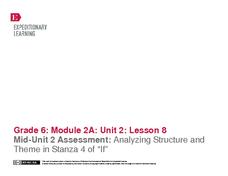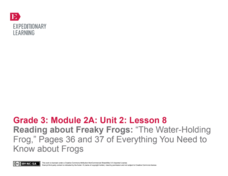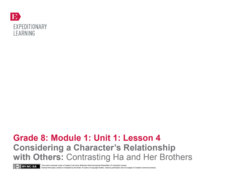Public Schools of North Carolina
Democratic Republic of Congo - Map Skills
Work on your map skills with a packet of activities about the river basins in the Democratic Republic on Congo. Learners study the maps provided before answering the geography questions and writing an acrostic poem about the region.
EngageNY
Analyzing Structure and Theme in Stanza 4 of “If”
Here is a lesson that provides scholars with two opportunities to stretch their compare-and-contrast muscles. First, learners compare and contrast their experience reading the fourth stanza of If by Rudyard Kipling to listening to the...
EngageNY
Reading about Freaky Frogs: “The Water-Holding Frog"
Boost reading comprehension skills with a lesson all about freaky frogs. A poem hooks scholars and takes them into a reading of an informational text followed by peer discussions. A three-page worksheet focuses on text features and...
Minnesota Department of Natural Resoures
Tree Life
The life of a tree is the focus of a packet consisting of several activities all covering a different subject. Second graders measure shadows, make pinecone critters, write poems, count rings, complete a word search, play tree tag, and...
EngageNY
End of Unit 3 Assessment: Using Strong Evidence
Young poets view a model two-voice poem while discussing capitalization and punctuation. Pupils also complete an end-of-unit assessment about using strong evidence to support a literary analysis.
MENSA Education & Research Foundation
Ecosystems
Explore the Earth's different ecosystems through four lessons, an assessment, and extension activities. Lessons include informative text and step-by-step instructions to apply knowledge in interactive, and thought provoking ways; such as...
EngageNY
Introducing Final Performance Task and Analyzing Statistics
How do statistics help people understand the universal refugee experience? Using the resource, scholars engage in an activity called a Chalk Talk, working in teams to analyze statistics from informational texts about refugees. Also, they...
ReadWriteThink
Word Recognition Strategies Using Nursery Rhymes
As a class, scholars read the poems, Humpty Dumpty, Peter, Peter, Pumpkin Eater, and Jack and Jill, in order to identify words with the same ending sound. Using their rhyming skills, learners brainstorm additional words from word...
EngageNY
Comparing Text Structures: To Kill a Mockingbird and “Those Winter Sundays” (Chapter 6 and 7)
Scholars carry out a close read of the poem "Those Winter Sundays" to determine its point. They look at the words used and the structure of the stanzas and then compare the poem's narrative structure to chapter 6 of To Kill a...
EngageNY
Reading about Freaky Frogs: “The Amazon Horned Frog"
The Amazon Horned Frog is the focus of a activity designed to encourage readers to ask and answer questions. A frog-themed poem opens the door to a whole-group discussion. Following a read-aloud of an informational text, a three-page...
EngageNY
Inferring about Character: Close Reading of the Poem “Inside Out” and Introducing QuickWrites
Grab a partner! Scholars partner up to take a second look at the verse novel Inside Out & Back Again. They discuss questions about and connections to the novel and then learn how to complete a Quick Write task properly. To finish,...
EngageNY
Developing Reading Fluency: Selecting a Text and Practicing Reading Aloud
Young readers continue to strengthen their fluency skills with a text of their choosing. The teacher first engages the class with an audio recording or read-aloud of a short poem, modeling for children how to read fluently. Next it's...
National Endowment for the Humanities
Charles Baudelaire: Poète Maudit (The Cursed Poet)
After learning the main ideas of the Decadent movement, learners work in small groups to read and translate poems by the French poet Charles Baudelaire using basic etymology skills. They then read the accurate English translations to see...
MENSA Education & Research Foundation
Magical Musical Tour: Using Lyrics to Teach Literary Elements
Language arts learners don't need a lecture about poetry; they listen to poetry every day on the radio! Apply skills from literary analysis to famous songs and beautiful lyrics with a instructional activity about literary devices. As...
MENSA Education & Research Foundation
Utopia/Dystopia: The American Dream
America was founded by dreamers, and the American dream still resonates in our country today. Track the American dream from its Puritan beginnings to its optimistic descendants with a instructional activity that focuses on speeches by...
Southern Nevada Regional Professional Development Program
Close Reading in the Classroom
Close reading is key to the analysis and interpretation of literature. A close reading of the title and the epigraph of “The Love Song of J. Alfred Prufrock” offers readers an opportunity to examine how even single words or names can...
Our White House
The Our White House Inauguration Celebration Kit for Kids!
Get the youngest American citizens involved in the presidential election and inauguration with a set of social studies activities. Focusing on the history of presidential inauguration ceremonies, learners draft their own poems, design...
Carolina K-12
Introduction to the Holocaust
Young historians gain a well-rounded insight into the tragedy of the Holocaust by exploring pre-war Jewish life, reading and discussing survivor testimonies, and illustrating their understanding by using their own words and those of a...
Novelinks
The Little Prince: Biopoem Strategy
Learn about character traits with a biopoem activity. Based on Antoine de Saint-Exupéry's The Little Prince, the activity prompts learners to fill in the blanks of a poem form to describe themselves.
Rainforest Alliance
Sounds of the Rainforest
Do you hear what I hear? Encourage scholars to use their listening skills and participate in a series of activities that demonstrate how the sense of hearing is crucial to the human and animal world. Activities guide learners on nature...
EngageNY
End of Unit Assessment: On-Demand Informational Paragraph About How the Poison Dart Frog Survives
A final assessment marks the end of a unit that takes a close look at a variety of informational texts all about frogs. A graphic organizer aides scholars in planning an accordion paragraph using their recorder forms from previous...
EngageNY
Considering a Character’s Relationship with Others: Contrasting Ha and Her Brothers
Who is Ha? Scholars look closely at the poem Papaya Tree and carefully examine the character Ha. Learners work in groups to create an anchor chart defining Ha's character. They also answer text-dependent questions to help with...
EngageNY
Development of the Plot: Impending Danger and Turmoil
Danger! Scholars look closely at two poems, 'TV News' and 'Closed Too Soon.' While reading, learners think about Ha's country's increasing dangers and conflict. They record their thoughts in graphic organizers and discuss what details...
EngageNY
Finishing Who? Where? and Why? Research
Who? Where? Why? Scholars answer these questions to help identify the gist of Inside Out & Back Again. First, they add text evidence to their research folders. They then begin looking at a performance task in which they write their...
Other popular searches
- Acrostic Poems
- Shape Poems
- Rhyming Poems
- Acrostic
- Examples of Diamante Poems
- Color Poems
- Onomatopoeia Poems
- Christmas Tree Shape Poem
- Adjective Words in Poem
- Diamante Poems
- Onomatopoeia Poems Examples
- Concrete Poems

























